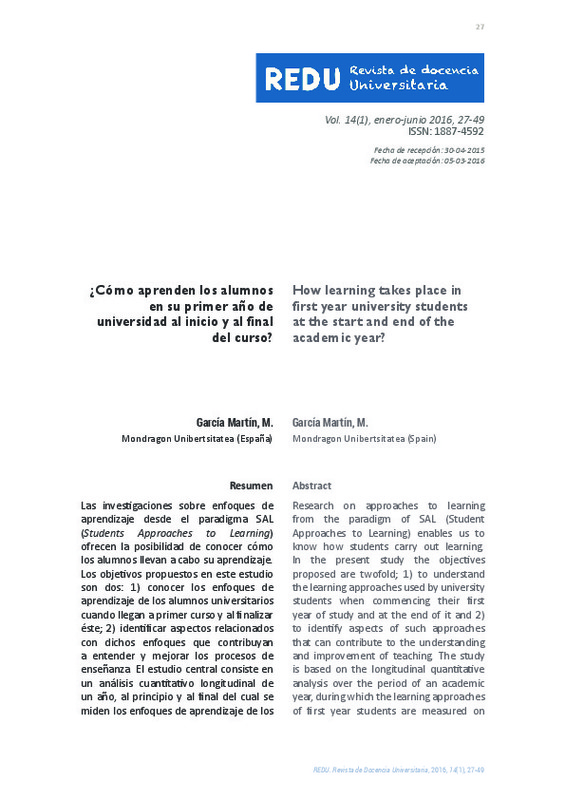JavaScript is disabled for your browser. Some features of this site may not work without it.
Buscar en RiuNet
Listar
Mi cuenta
Estadísticas
Ayuda RiuNet
Admin. UPV
¿Cómo aprenden los alumnos en su primer año de universidad al inicio y al final del curso?
Mostrar el registro sencillo del ítem
Ficheros en el ítem
| dc.contributor.author | García Martín, M.
|
es_ES |
| dc.date.accessioned | 2016-09-22T11:47:25Z | |
| dc.date.available | 2016-09-22T11:47:25Z | |
| dc.date.issued | 2016-06-30 | |
| dc.identifier.issn | 1887-4592 | |
| dc.identifier.uri | http://hdl.handle.net/10251/70319 | |
| dc.description.abstract | [EN] Research on approaches to learning from the paradigm of SAL (Student Approaches to Learning) enables us to know how students carry out learning. In the present study the objectives proposed are twofold; 1) to understand the learning approaches used by university students when commencing their first year of study and at the end of it and 2) to identify aspects of such approaches that can contribute to the understanding and improvement of teaching. The study is based on the longitudinal quantitative analysis over the period of an academic year, during which the learning approaches of first year students are measured on its commencement and termination. In addition, a further quantitative analysis is carried out at the end of the academic year based on open questions related to learning approaches and the educational context. The instrument used for this longitudinal study on 188 students at the Faculty of Humanities and Education of Mondragon Unibertsitatea is the R-SPQ-2F (Biggs et al., 2001), adapted into Basque and validated (Garcia, 2011). The results show that while at the start of the course a specific learning approach does not prevail, over the course of their first year the students evolve positively, increasing their capacity for in-depth focus and reducing their surface approach to learning. This study is part of a larger longitudinal study on the same students extending until their graduation in their fourth and final year, which is currently undergoing data analysis and the results will be forthcoming. | es_ES |
| dc.description.abstract | [ES] Las investigaciones sobre enfoques de aprendizaje desde el paradigma SAL (Students Approaches to Learning) ofrecen la posibilidad de conocer cómo los alumnos llevan a cabo su aprendizaje. Los objetivos propuestos en este estudio son dos: 1) conocer los enfoques de aprendizaje de los alumnos universitarios cuando llegan a primer curso y al finalizar éste; 2) identificar aspectos relacionados con dichos enfoques que contribuyan a entender y mejorar los procesos de enseñanza. El estudio central consiste en un análisis cuantitativo longitudinal de un año, al principio y al final del cual se miden los enfoques de aprendizaje de los sujetos. Además, al final del curso también se realiza un análisis cualitativo basado en preguntas abiertas relacionadas con los enfoques de aprendizaje y el contexto educativo. El instrumento utilizado es el R-SPQ-2F (Biggs, Kember y Leung, 2001) validado en su adaptación al euskera (García, 2011) y la muestra del estudio longitudinal comprende 188 estudiantes de la Facultad de Humanidades y Educación de Mondragon Unibertsitatea. Los resultados muestran que si bien al comienzo del curso no prevalece un enfoque de aprendizaje determinado, durante el primer año los estudiantes evolucionan positivamente, aumentando su enfoque profundo y reduciendo su enfoque superficial hacia el aprendizaje. El presente estudio forma parte de una investigación longitudinal de mayor magnitud sobre los mismos alumnos, llevada a cabo al finalizar éstos el cuarto curso del título de grado. Dicha investigación se halla actualmente en proceso de análisis de datos y próximamente conoceremos los resultados. | es_ES |
| dc.description.sponsorship | Esta investigación ha recibido financiación del Programa para la promoción de la universidad en la sociedad del conocimiento convocado por la Diputación Foral de Guipúzcoa y cofinanciado por el Fondo Social Europeo, Fondo Europeo de Desarrollo Regional y Programa e-Gipuzkoa. Título de dicha investigación: Una propuesta de intervención para el desarrollo de la competencia de aprender a aprender. (Referencia: F20079497). | |
| dc.language | Español | es_ES |
| dc.language | Inglés | es_ES |
| dc.publisher | Universitat Politècnica de València | |
| dc.relation.ispartof | REDU. Revista de Docencia Universitaria | |
| dc.rights | Reconocimiento - No comercial - Sin obra derivada (by-nc-nd) | es_ES |
| dc.subject | European Higher Education | es_ES |
| dc.subject | University students | es_ES |
| dc.subject | Activiy learning | es_ES |
| dc.subject | Competency based teaching | es_ES |
| dc.subject | Educational contexts | es_ES |
| dc.subject | Approaches to learning | es_ES |
| dc.subject | Espacio Europeo de Educación Superior | es_ES |
| dc.subject | Estudiantes universitarios | es_ES |
| dc.subject | Métodos activos | es_ES |
| dc.subject | Desarrollo de competencias | es_ES |
| dc.title | ¿Cómo aprenden los alumnos en su primer año de universidad al inicio y al final del curso? | es_ES |
| dc.title.alternative | How learning takes place in first year university students at the start and end of the academic year? | es_ES |
| dc.type | Artículo | es_ES |
| dc.date.updated | 2016-09-20T13:19:36Z | |
| dc.identifier.doi | 10.4995/redu.2016.5911 | |
| dc.relation.projectID | info:eu-repo/grantAgreement/Diputación Foral de Gipuzkoa//F20079497/ | |
| dc.rights.accessRights | Abierto | es_ES |
| dc.description.bibliographicCitation | García Martín, M. (2016). ¿Cómo aprenden los alumnos en su primer año de universidad al inicio y al final del curso?. REDU. Revista de Docencia Universitaria. 14(1):27-50. https://doi.org/10.4995/redu.2016.5911 | es_ES |
| dc.description.accrualMethod | SWORD | es_ES |
| dc.relation.publisherversion | https://doi.org/10.4995/redu.2016.5911 | es_ES |
| dc.description.upvformatpinicio | 27 | es_ES |
| dc.description.upvformatpfin | 50 | es_ES |
| dc.type.version | info:eu-repo/semantics/publishedVersion | es_ES |
| dc.description.volume | 14 | |
| dc.description.issue | 1 | |
| dc.contributor.funder | Diputación Foral de Gipuzkoa | |
| dc.contributor.funder | European Social Fund | |
| dc.contributor.funder | European Regional Development Fund |








